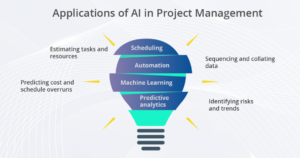Project Management Trends in 2024


In 2024, the landscape of project management is undergoing a significant transformation, driven by technological advancements and evolving workforce dynamics.
As organizations strive for greater efficiency and adaptability, project managers increasingly embrace innovative methodologies and tools that enhance collaboration and decision-making.
This year marks a pivotal shift towards a hybrid approach that integrates various project management methodologies. This approach allows teams to tailor their strategies to meet specific project needs while maintaining flexibility in execution.
The Rise of AI and Automation

Artificial Intelligence (AI) is set to revolutionize project management by enhancing efficiency and accuracy. According to a survey by Capterra, 93% of project managers reported a positive return on investment (ROI) from AI tools, highlighting their transformative potential.
AI applications range from automating routine tasks like scheduling and reporting to complex functions such as resource allocation and risk management.
AI fundamentally shifts how project managers approach task automation and decision-making. By automating routine tasks, AI allows project managers to allocate their time and resources more effectively, fostering innovation and strategic thinking.
AI-powered tools analyze vast amounts of data rapidly, providing actionable insights that guide decision-making. For instance, when a project faces potential delays, AI can identify the root causes and recommend solutions based on similar past projects. This proactive approach minimizes risks and optimizes outcomes.
Moreover, AI systems continuously learn and adapt, improving their performance over time. These systems refine their algorithms as they process more data, leading to increasingly accurate predictions and more effective recommendations.
Project managers can harness this evolving intelligence to make informed decisions, resulting in higher project success rates.
Automation in Routine Tasks
Automation profoundly impacts routine tasks, significantly enhancing productivity and reducing the likelihood of human error. Project managers can now automate various functions, such as:
- Scheduling: AI tools can automatically schedule meetings, assign tasks, and manage timelines based on team availability and project requirements. Solutions like Trello and Asana incorporate features that adjust schedules in real-time, ensuring optimal resource allocation.
- Reporting: Automated reporting tools compile data from various project sources, generating comprehensive reports with minimal manual input. Tools such as Tableau and Power BI use AI to visualize data and provide insights that help project managers track progress and performance metrics efficiently.
- Task Tracking: AI-driven platforms can monitor task completion and team performance, alerting project managers to potential bottlenecks before they escalate. These systems help maintain momentum and ensure projects stay on track.
Examples of Tasks Being Automated
Several specific tasks exemplify the effectiveness of automation in project management:
- Budget Tracking: AI tools can automatically update financial data and forecast future expenses based on spending patterns, reducing the time spent on manual budget adjustments.
- Resource Allocation: AI algorithms analyze project requirements and team availability to recommend the best resource allocation, ensuring that teams work at optimal capacity without overloading individuals.
- Risk Management: AI systems can continuously assess project risks by analyzing data from various sources, including market trends and team performance. They provide early warnings about potential issues, allowing project managers to mitigate risks proactively.
Increased Automation of Project Management Tasks
As AI technologies become more integrated into existing platforms and workflows, project managers can anticipate that many of their daily tasks will increasingly be automated. A 2019 study by Gartner predicts that by 2030, advancements in machine learning, big data analytics, and natural language processing (NLP) will lead to the elimination of 80 percent of all project management tasks.
Project managers need not worry about being replaced. Research indicates that only 35 percent of current projects are deemed successful, while a striking 65 percent suffer from wasted resources and unrealized benefits, largely due to reliance on outdated technologies for management. AI has the potential to enhance project managers’ efficiency by automating routine tasks, allowing them to concentrate on high-level issues that are essential for a project’s overall success.
Hybrid Project Management Methodologies
The shift towards hybrid methodologies—combining Agile, Waterfall, and Lean practices—reflects the need for flexibility in project management. Organizations are moving away from rigid frameworks to more tailored approaches that suit specific project environments.
This trend empowers project managers to leverage their judgment and critical thinking skills to select the most effective methodology for each project.
Benefits of Hybrid Approaches
One of the primary benefits of hybrid project management is flexibility. Each project comes with its own set of requirements, constraints, and stakeholders. Hybrid methodologies enable project managers to assess these factors and choose the most effective practices accordingly.
For instance, a project may start with a Waterfall approach to establish a clear project scope and timeline. As the project progresses and stakeholders provide feedback, managers can shift to Agile practices to incorporate iterative development and quick adjustments. This adaptability allows teams to respond to changes swiftly, which is particularly crucial in industries like software development, where market demands evolve rapidly.
Furthermore, hybrid methodologies support diverse team compositions. Teams with varying levels of experience and expertise can leverage their strengths through a combination of structured and flexible practices. This approach fosters collaboration and enhances team engagement, leading to improved project outcomes.
Increased Efficiency and Effectiveness in Project Delivery
Hybrid methodologies enhance efficiency and effectiveness in project delivery by combining the best practices from each approach. Teams can streamline processes by eliminating redundancies and focusing on value-adding activities.
For example, using Lean principles, teams can analyze workflows to identify bottlenecks and optimize resource allocation. By integrating this with Agile’s iterative cycles, teams can continuously refine their processes, ensuring that each iteration delivers maximum value. This results in quicker turnaround times and higher-quality outputs.
Additionally, hybrid approaches promote better risk management. Project managers can identify potential risks early in the Waterfall phases and address them in the Agile iterations, minimizing the likelihood of issues impacting project timelines and deliverables. This proactive risk management enhances overall project success rates.
Data-Driven Decision Making
Data analytics is becoming integral to project management, allowing for informed decision-making based on empirical evidence rather than intuition. The ability to analyze vast amounts of data enables project managers to track performance metrics, assess risks, and optimize resources effectively.
For instance, analytics can reveal patterns in resource utilization, allowing project managers to identify whether team members face overloading or underutilization. By tracking progress through data, managers can adjust workloads accordingly, ensuring that teams remain productive and engaged.
Additionally, data analytics facilitates the assessment of stakeholder satisfaction by correlating project metrics with feedback, allowing for proactive adjustments to enhance client relationships.
Tools and Techniques
- Data Visualization Tools: Tools like Tableau, Power BI, and Google Data Studio allow project managers to create intuitive dashboards and visual reports. These platforms transform complex data sets into easily digestible visuals, helping teams quickly grasp project status, trends, and anomalies.
- Project Management Software: Comprehensive project management tools like Asana, Monday.com, and Jira often integrate data analytics features. These tools enable teams to track tasks, timelines, and performance metrics in one centralized location, ensuring that everyone remains aligned on project objectives.
- Performance Measurement Techniques: Techniques such as Earned Value Management (EVM) provide frameworks for measuring project performance and progress. EVM integrates scope, schedule, and cost metrics, allowing project managers to assess project health and forecast future performance based on current data.
- Collaboration and Communication Tools: Platforms like Slack and Microsoft Teams facilitate real-time communication and collaboration, allowing teams to share data insights instantly. Integrating these tools with data analytics applications enhances visibility and fosters informed discussions among team members.
Enhanced Focus on Soft Skills
As technology takes over more technical tasks, the importance of soft skills—such as communication, leadership, and emotional intelligence—grows. Project managers must cultivate these skills to effectively lead teams, navigate stakeholder relationships, and foster collaboration.
High emotional intelligence enables project managers to foster strong relationships, resolve conflicts, and create a positive team atmosphere. Managers with strong EI can identify the emotional undercurrents that affect team dynamics, allowing them to address issues before they escalate. For instance, a project manager who notices signs of frustration in team members can intervene to provide support or reallocate tasks, thereby maintaining morale and productivity.
Moreover, emotional intelligence enhances a leader’s ability to communicate effectively and inspire others. Project managers who demonstrate empathy and understanding can build trust with their teams, increasing engagement and commitment.
Key Soft Skills for Success
- Communication: Effective communication is essential for successful project management. Project managers must convey ideas clearly and concisely to diverse audiences, including team members, stakeholders, and clients. They should also practice active listening to understand others’ perspectives, fostering open dialogue and collaboration. Strong communication skills help manage expectations and ensure all parties are aligned on project objectives.
- Stakeholder Engagement: Building and maintaining stakeholder relationships is vital for project success. Project managers must identify key stakeholders, understand their interests, and actively engage them throughout the project lifecycle. Effective engagement involves regular updates, soliciting feedback, and addressing concerns promptly. By establishing trust and rapport with stakeholders, project managers can secure buy-in and support, which is crucial for navigating challenges and achieving project goals.
- Team Dynamics: Understanding and managing team dynamics is essential for project leaders. Project managers must recognize team members’ unique strengths and weaknesses and foster an inclusive environment that promotes collaboration. They should facilitate team-building activities and encourage open communication to strengthen relationships within the team. By fostering a positive team culture, project managers can enhance productivity, creativity, and overall project outcomes.
Sustainability and ESG Practices
Sustainability increasingly influences project management practices as organizations recognize the importance of aligning projects with ESG principles. This trend reflects a broader societal shift towards corporate responsibility.
Sustainability influences project management in several crucial ways. Firstly, adopting sustainable practices can lead to resource efficiency, ultimately lowering costs. For example, energy-efficient technologies and sustainable materials can reduce operational expenses over time. Secondly, projects that emphasize sustainability often attract investors and clients who prioritize ethical practices, increasing market competitiveness.
Furthermore, sustainability fosters innovation. Project teams that integrate ESG principles tend to explore creative solutions to environmental and social challenges, leading to innovative products and services. This proactive approach not only enhances project outcomes but also aligns with the evolving demands of consumers who increasingly prefer sustainable options.
Moreover, effective management of ESG factors mitigates risks associated with regulatory compliance and reputational damage. As governments implement stricter environmental regulations, projects that adhere to sustainability principles are less likely to face legal challenges or public backlash. By proactively addressing ESG concerns, project managers can safeguard their organizations against potential risks and enhance stakeholder trust.
Strategies for Implementation
Successfully implementing ESG practices within project management requires strategic planning and commitment. Project managers can employ several key strategies to ensure alignment with ESG principles:
- Conduct ESG Assessments: Begin by assessing the current state of ESG practices within the organization. Identify gaps and areas for improvement through stakeholder consultations, surveys, and audits. Understanding the baseline will enable project managers to set clear, achievable goals.
- Develop a Sustainability Framework: Establish a comprehensive sustainability framework that outlines specific ESG objectives for projects. This framework should include guidelines for environmental impact assessments, social responsibility initiatives, and governance practices. Clear frameworks help teams stay focused and accountable.
- Engage Stakeholders: Actively involve stakeholders throughout the project lifecycle. Conduct regular consultations with community members, clients, and team members to gather feedback on sustainability initiatives. Engaging stakeholders fosters a sense of ownership and ensures that projects address community needs effectively.
- Integrate Sustainability into Project Planning: Embed sustainability considerations into the project planning process. Incorporate ESG criteria into project proposals, timelines, and budgets. For example, prioritize eco-friendly materials, waste reduction strategies, and community engagement efforts in project designs.
- Measure and Report Progress: Establish metrics to measure ESG performance throughout the project lifecycle. Regularly report progress to stakeholders to enhance transparency and accountability. Utilize tools like sustainability dashboards to visualize key performance indicators (KPIs) related to environmental impact, social benefits, and governance practices.
Examples of How Projects Can Align with ESG Principles
Numerous projects across various sectors exemplify effective alignment with ESG principles:
- Green Building Projects: In the construction industry, projects that adhere to sustainable building practices significantly reduce environmental impacts. For example, projects certified by the Leadership in Energy and Environmental Design (LEED) program focus on energy efficiency, water conservation, and the use of sustainable materials. These buildings often result in lower utility costs and enhanced occupant satisfaction.
- Renewable Energy Initiatives: Projects focused on renewable energy sources, such as solar or wind farms, directly align with environmental sustainability goals. These projects reduce reliance on fossil fuels, lower greenhouse gas emissions, and contribute to energy independence. Companies that invest in renewable energy projects enhance their reputation as socially responsible entities.
- Community Development Programs: Projects that prioritize social sustainability can improve community well-being. For instance, affordable housing initiatives that engage local stakeholders and address housing shortages not only provide homes but also foster economic development. By integrating community needs into project planning, organizations can create lasting positive impacts.
- Sustainable Supply Chain Management: Organizations can implement projects that focus on sustainable supply chain practices. By partnering with suppliers who adhere to ethical labor practices and environmental standards, companies can ensure that their products align with ESG principles. This approach enhances brand integrity and strengthens customer loyalty.
Organizations Will Prioritize Resource Management to Stay Efficient
Organizations increasingly focus on optimizing resource management to maintain cost-effectiveness and maximize profits. As businesses navigate economic pressures and competitive markets, they recognize that efficient resource allocation is vital for sustainable growth. Research and Markets forecasts that the North American enterprise resource planning (ERP) market will grow significantly, reaching an estimated $31.98 billion by 2029, up from $20.30 billion in 2024. This growth reflects a compound annual growth rate of 9.51 percent, underscoring the rising importance of resource management solutions.
Effective resource management not only lowers costs but also enhances overall project performance. Organizations can improve productivity and reduce waste by aligning resources with strategic goals. A study by McKinsey & Company highlights that companies that prioritize resource efficiency can achieve up to 25% higher profitability compared to their less efficient counterparts.
As such, project management professionals will play a crucial role in these organizational efforts, driving initiatives that optimize resource use across all projects.
Cloud-based Project Management Software like Juntrax topped the charts for their unparalleled assistance, prompt functioning, and various tools that upgraded businesses’ work quality and decorum.